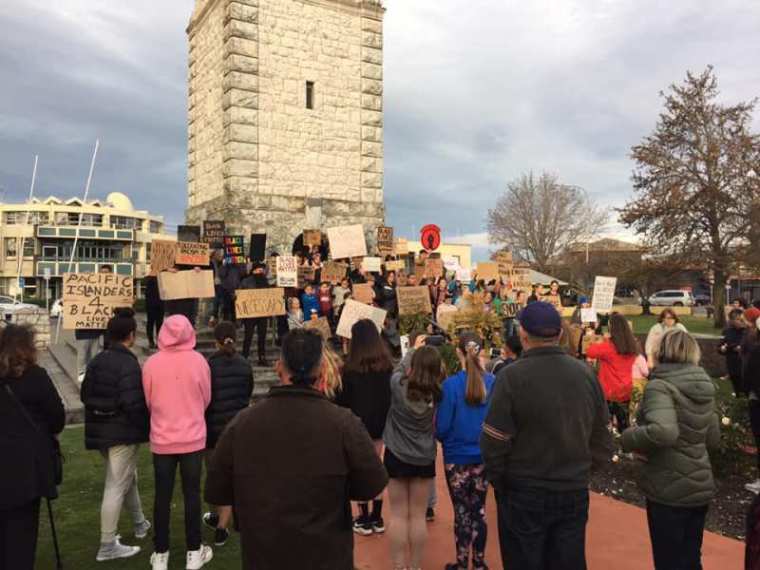
According to the dictionary, protest is a noun that describes “a statement or action expressing disapproval of or objection to something”. This description seems to fall a little flat in comparison to what’s been happening in the United States since the 25th of May this year.
Riots, looting, peaceful protests turn dangerous by police, civilian unrest across the country. How did this happen? George Floyd’s murder at the hands of the police for many people was the straw that broke the camel’s back.
Covid-19 has made many of us stop and be still long enough to really see what's been happening in our world and all the injustices that happen every day. For me, I have been watching this space for a few years now.
After witnessing racial profiling in America towards people I am close to back when I was in my early 20’s opened my eyes to the truth. Racism never stopped. It is a physical battle, a mental and emotional battle, a social and relational battle as well as a spiritual battle.
In terms of Te whare tapa wha, this four way attack can have a huge impact on your overall health and how you view yourself and your world.
Why are humans racist?
There are many ideas out there about why some people are racist. Some believe it stems from when we were tribes competing for resources and we evolved with this trait to “other” each other in pursuit of more stuff. Some believe it's our sinful nature. Both could very well be a part of the puzzle.
Psychology Today posted an article explaining that the psychology around racism has little to do with evolution “but is primarily a psychological trait — more specifically, a psychological defense mechanism generated by feelings of insecurity and anxiety. There is some evidence for this view from the psychological theory of "terror management."
As hard as it is to have empathy for a person who spews hate at someone because of their skin colour, I do believe this is the high road Christ calls us to take.
Matthew chapter 5, verse 44 says, “But I tell you, love your enemies and pray for those who persecute you…”
Firstly, I am in no way trying to tell people of colour how to feel or what to do when confronted by racism.
Having grace for people and where they’re at is difficult during normal moments of discord. Something as emotionally driven as racism feels impossible.
Phrases like “all lives matter” are frustrating at best and offensive at worse. And yet I feel God reminding me that being an ally to the oppressed doesn’t include alienating the perpetrators. Racism won't disappear through just police reform. Hearts must be restored.
I have a lot of empathy towards the people who are protesting and even for the rioters. A lot of people are very angry and the whole situation is being handled poorly. They have nowhere to place their justified rage, they have no catharsis. Our youth need the wisdom of our elders. We need to come together.
I was a part of a protest of solidarity for Black lives matter last weekend in my small town in New Zealand. My husband (who is American) and I spoke to the newspaper in regards to the event which caused a big stir on social media. A lot of disappointing comments came our way. We were uneasy about attending.
Roughly 300 people turned up. Mostly young people which was very encouraging.
The week leading up to this we experienced waves of emotions, especially my husband. Lots of anger, hurt, and hopelessness.
Being at the protest was the catharsis we needed. It was restoring to be around like minded people and a Godly appointment. It’s hard to describe but it was what my soul needed.
Moving forward
The conversation of racism doesn’t end after attending one protest. There is much more to be done. I pray that what is happening in the United States is the birth pains of something better to come. Spiritual battles have physical world counterparts.
So, where to from here?
Dismantling systems of oppression are long overdue in America. But what about our own shores? How do we in other parts of the world take on racism?
Firstly, know the history. History of colonialism in my country, New Zealand, alone has ripple effects into the present that hold us and bind us. We must confront these things in order to break these chains.
The bible says in Psalm 82, verse 3, “Defend the weak and the fatherless; uphold the cause of the poor and oppressed.” We are called to be allies.
What comes after that is restoration and reconciliation.
I have more I could add but I am very conscious of my own privilege as a white female living in western civilization. I encourage readers to listen to people who are more closely affected by this stuff who are wanting to share their stories.

Chanell Diaz is a member of The Salvation Army in New Zealand. She and her husband Ronald both work as child care workers and Chanell is also a qualified Youth Worker through Praxis. Chanell has a heart for justice and enjoys creating art and writing in her spare time.